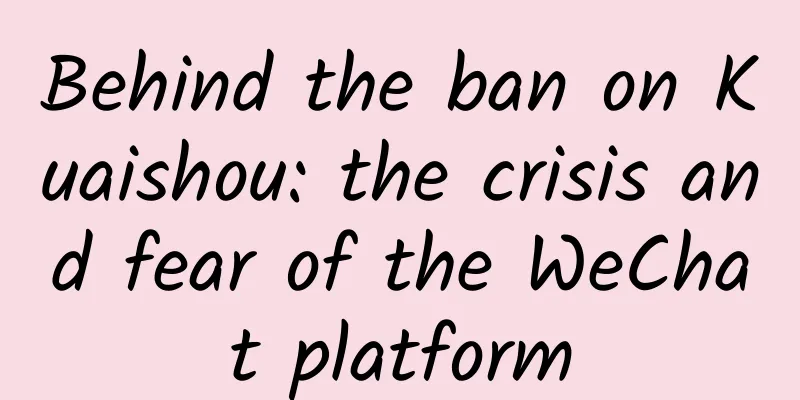Behind the ban on Kuaishou: the crisis and fear of the WeChat platform

|
After a few days of hesitation, WeChat gave the reason for banning Kuaidi Taxi: it induced users to click on the link to share. When the media asked why Didi Taxi, which had the same behavior, was not banned, WeChat did not respond. Obviously, this is a selective ban. When people realize that Kuaidi Dache is backed by Alibaba and Didi Dache is backed by Tencent, they understand the deep meaning of this selectivity: How could Tencent tolerate a rival company running into its yard to distribute red envelopes, conduct promotions, and compete with Didi Dache for popularity? It seems that WeChat really needs to take action against Kuaidi. In the past year, Didi and Kuaidi have been fighting each other. The public still remembers the 1 billion anti-subsidy war between Kuaidi and Didi at the end of last year, and they are a little excited when they think about it. In fact, those who are familiar with it understand that the leading parties behind the battle between the two major taxi apps are actually Alipay and WeChat Pay. In March this year, after the subsidies stopped, the two sides began to compete in the markets of mobile operators, real estate service providers and even financial institutions. In short, in the past year, the war concentrated on the C-end has spread to the B-end industry customers. However, even if they don’t want to see their competitors running promotions on their platform, they won’t ruthlessly ban a red envelope activity. This makes people feel that WeChat is so narrow-minded. The open spirit it boasts has become a decoration. In my opinion, the underlying motivation behind the ban does not lie in the competition among ride-hailing apps, but rather WeChat’s overall sense of crisis and concerns. In my eyes, although WeChat has always been regarded as the core of China's OTT field and the greatest force in placing telecom operators in the pipeline, when WeChat's basic user base reaches hundreds of millions, it itself faces the risk of being OTT and reduced to a pipeline. You may not agree. But if you look at the WeChat ecosystem, apart from social functions, WeChat payment, public accounts that emphasize reading, and games, its commercialization system, especially in terms of application scenario construction, has not achieved much success so far. WeChat’s introduction of a public account system is indeed a major innovation. Through service accounts, businesses, services, media and users are connected, and offline resources can be connected to form a huge O2O closed loop. In terms of Internet connection hardware, WeChat has an open hardware platform, QQ has launched QQ IoT, and Tencent has also launched the “Fun Driving” smart car connection solution with NavInfo. The model is perfect in form, but not so beautiful in actual operation. In fact, even two of Tencent’s core strategic partners recently expressed criticism of WeChat’s inability to build commercial application scenarios, saying that it is not as good as QQ Mobile. And JD.com’s traffic from WeChat last quarter was far less than JD.com’s independent APP. WeChat, once a myth, is not omnipotent. It should be said that the popularity of WeChat has weakened compared to six months ago. When social platforms such as Sina Weibo began a new round of monetization, and when domestic and foreign competitors began to reposition their strategies, the pressure on WeChat has gradually emerged. The phone book it launched a few days ago has rekindled enthusiasm, but the operation has shifted to traffic management, and the effect of this action is far less than expected. On the contrary, I think it is more like exposing the information that WeChat's traffic is weakening. This is also the common destiny of each generation of the Internet. When portals were born in the past, people thought that was the ultimate, and then search engines came out, e-commerce came out, and social platforms came out. Generation after generation, they all had a subversive attitude when they were first born. Facing past platforms, especially the old and decrepit traditional platforms, you have countless pride. Once you reach a considerable scale, you will encounter diminishing marginal returns, and countless people will use your platform to operate their own models. And you have changed from a disruptor to a basic service provider with a clear conservative tendency, and from then on you have the characteristics of a pipeline. Many years later, the lucky ones have become basic services, and the unlucky ones have been wiped out. Don’t always think that WeChat will be a platform that will last forever, and it will have the same market position in the future. Ali’s Laiwang may not necessarily be able to defeat it, and Sina Weibo’s new round of restructuring may form a clear competitive differentiation, but in the unknown corners, new forces may be brewing to subvert WeChat. I think the OTT crisis facing WeChat may be more serious than the crisis it brings to telecom operators. Because, unless the country completely opens up the channels of telecom operators, you can’t bypass them, after all, there are only three major operators. Tencent WeChat is just a platform for countless Internet companies. Ma Huateng positioned Tencent as a "connector" that connects people, services, and hardware. Tencent will work with as many partners as possible to create a more advanced Internet ecosystem. In the transition from PC Internet to mobile Internet, QQ and WeChat have created many new opportunities. Ma Huateng said that Tencent's second major development principle is to be open and build an ecosystem. It cannot be done by one company alone, "it must be an open and inclusive new ecosystem with many partners participating and divided into multiple layers." Now, Tencent has handed over many non-core businesses to partners, such as the search and e-commerce businesses, which are respectively cooperated with Sogou and JD.com. I think that what Ma Huateng said about building a new ecosystem is also an expression of crisis awareness. Because among BAT and several medium-sized Internet companies, Alibaba, JD.com, and Dianping have the fastest integration with offline. When Alibaba continues to sink its services and fully integrate into the lives of the masses, Tencent's WeChat platform has been taken over by it as OTT. Of course, Tencent's O2O ecosystem has a slight advantage over Baidu's O2O ecosystem, but overall, the WeChat ecosystem is far from rich enough. In the short term, Tencent cannot get rid of the embarrassment of making money mainly through games. Another aspect of the crisis is that Tencent’s past temperament has not faded. In the past years, it has banned its partners many times. This selective ban on Kuaidi Taxi is a huge irony. In the face of the continuous emergence of new forces from telecom operators, Tencent WeChat, after being overtaken by countless small and medium-sized enterprises, began to turn around and pass the pressure of open platform innovation to customers. The more fearful they are, the more they continue to demonstrate their power. If you read the Tencent WeChat Software License and Service Agreement carefully, you will see that a platform that contradicts many of Ma Huateng's remarks is demonstrating its power. The rights and interests of the WeChat platform basically belong to Tencent, and the risks basically belong to the users. During this process, WeChat has been blocked many times, and of course it has been blocked by others. Now is its golden period for monetization, and I believe that Kuaidi Taxi will not be the last one to be blocked by WeChat. I also believe that when these platform hegemony behaviors become WeChat’s daily basic actions, a new subversive force will slowly emerge in front of it. As a winner of Toutiao's Qingyun Plan and Baijiahao's Bai+ Plan, the 2019 Baidu Digital Author of the Year, the Baijiahao's Most Popular Author in the Technology Field, the 2019 Sogou Technology and Culture Author, and the 2021 Baijiahao Quarterly Influential Creator, he has won many awards, including the 2013 Sohu Best Industry Media Person, the 2015 China New Media Entrepreneurship Competition Beijing Third Place, the 2015 Guangmang Experience Award, the 2015 China New Media Entrepreneurship Competition Finals Third Place, and the 2018 Baidu Dynamic Annual Powerful Celebrity. |
<<: Xiaomi's Lei Jun plays with chip giants in the palm of his hand?
>>: Operator Transformation 2.0: How to be reborn?
Recommend
The more you eat, the whiter your skin becomes?! The truth is...
Whitening - an eternal topic in the skin care ind...
Tik Tok packaging, promotion, monetization and other operation tutorials!
Pop art master Andy Warhol said that everyone can...
Allergies, inflammation, skin diseases… Can we still take our children to the water park when it’s so “dirty”?
In the hot summer, the best way to cool off is to...
Yiping expands the world | Huanwang joins hands with automotive media to open up new traffic for large screens
According to public market data statistics, there...
Analysis of Xiaohongshu Enterprise Account Operation (Food Edition)
This article analyzes the operation of Xiaohongsh...
Are Hungarians descendants of the Huns?
In China, there is an old saying that Hungarians ...
The evolving choice of China's home appliance industry from mechanical to humanized intelligence
It cannot be said that the "collective carni...
Itching, itching, itching and peeling may also be cancer?
Review expert: Zhang Yuhong, chief physician of t...
It is difficult to create a road without a road: the legendary discovery journey of green fluorescent protein
Green fluorescent protein can form chromophores b...
6 ways to attract new users to securities apps
With the development of the Internet, traditional...
A 10,000-word research report on Xiaohongshu!
It took nearly 3 working days, and the content co...
How do senior designers use the “Pareto Principle” to make design decisions?
Editor's note : This article is from the desi...
If your breasts sweat during exercise, maybe you are wearing the wrong sports bra? The answer is not what you think...
Compiled by: Gong Zixin A few days ago A friend t...
“Good medicine tastes bitter” is a thing of the past! Why are medicines less bitter nowadays?
In the childhood memories of many people born in ...
Don't squeeze hard little lumps on your skin! They are prone to recurrence and leave scars
Many people like to scratch their skin when they ...




![[Jiang Xiaoxi Talks about Poyang Lake] Are you the same, always wanting to sing something while working?](/upload/images/67f1da82f01e1.webp)




